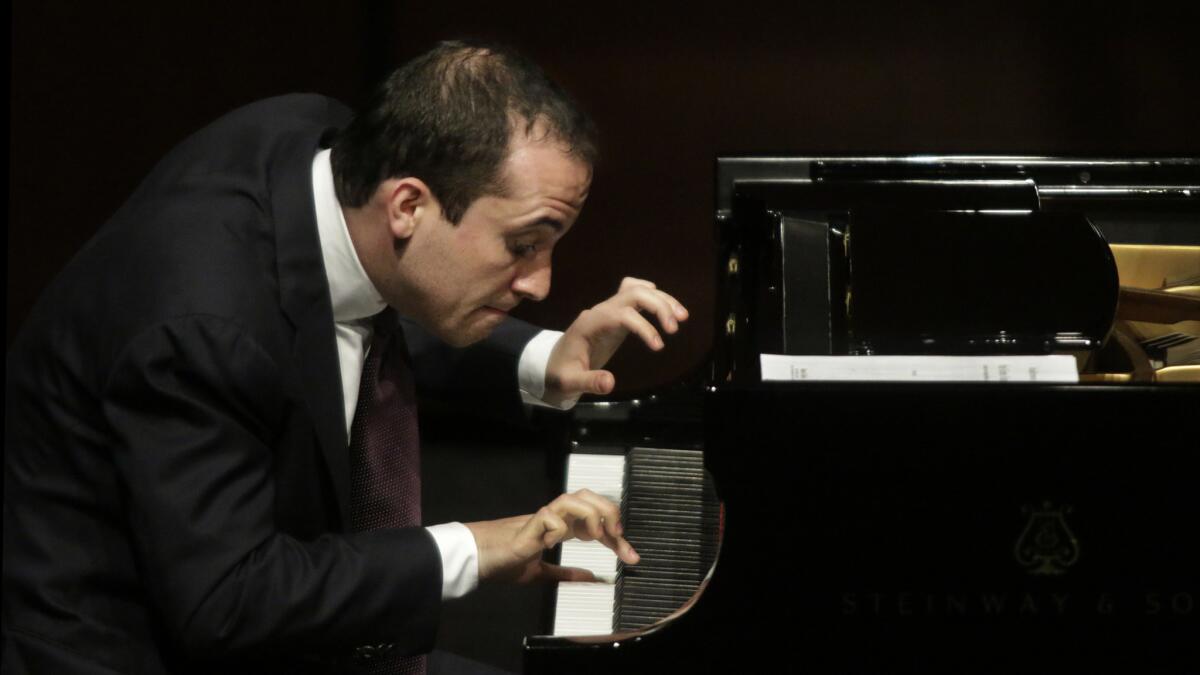Review: Igor Levit, the best Russian pianist you haven’t heard...yet

- Share via
I have never known a time when there wasn’t a young Russian or Moscow-trained pianist of promise on the scene. It is no different now. Twenty-four-year-old Daniil Trifonov, gold medalist of the International Tchaikovsky Competition, is already a star.
Igor Levit, born in Nizhny Novgorod in 1987, is not as well known. His Southern California debut Tuesday night was a moderately attended recital in Beverly Hills at the Wallis Annenberg Center for the Performing Arts.
But it was a major event, at least for me. Levit has garnered impressive reviews. But with so many fine Russians ever coming down the pipeline, one can get little blasé. I found Levit’s new CD of Bach’s Six Partitas nicely played, elegant even, but unremarkable.
He tweets, and that didn’t inspire confidence either. Heading to the concert, he ate his best brownie ever on Beverly.
Levit appeared on stage a fashionable young man with close-cropped hair and a fitted, stylish suit with a sharp white pocket-handkerchief that made him look like a film star from the ‘30s. Seen in profile at the piano, he had a remarkable resemblance to George Gershwin.
That resemblance didn’t stop with appearances. Levit began his mostly conventional program with Bach’s First Partita. The brownie business turned out to be preparation for the exquisite liquidity of his playing.
Levit’s is modern, levitating Bach. He uses the pedal with great finesse to create a subtle lyrical flow, rather than attempt to achieve the effect of harpsichord clarity. He has a magical way with inner lines, which he causes to appear like stunning tropical fish swimming in an exotic, clear blue sea.
But he’s got rhythm. This was also Bach with an almost jazzy character.
A recording offers only a little warning of Levit’s originality or presence. He is expressive at the keyboard. He moves as though he is made of rubber, his arms and fingers seem elastic, stretching and contracting as he plays, shaping phrases. His tone is gorgeous.
But this was only Bach. The program contained two Beethoven sonatas, Prokofiev’s Seventh Sonata and a novelty — Ronald Stevenson’s Fantasy on “Peter Grimes.” Each was played in a different, unpredictable, fascinating way.
In Beethoven’s Sonata No. 22, Levit produced shockingly percussive outbursts. He opened Beethoven’s “Tempest” Sonata by using the pedal to blend arpeggiated individual pitches into clusters of ever-morphing consonances and dissonances, as if the piano had somehow become an electronic instrument. In that sonata’s slow movement, he stopped time. In the furiously played Finale, he miraculously sped up time.
The glory of Stevenson’s “Grimes” was the atmosphere. Here Levit created the mysterious sense of a foggy, ominous morning in a British fishing village. Prokofiev’s sonata, a Soviet response to World War II, had, in Levit’s playing, profound sonic depth and profound violence.
The question that lingered throughout this arresting recital was what kind of a pianist Levit really is. He exhibited fresh ideas about every phrase he played. He has seemingly unlimited technical capacity.
He is clearly thoughtful. The Wallis, which is still trying to figure out how to put on concerts, didn’t include program notes or even a list of movements for the individual pieces, so Levit spoke eloquently about Stevenson. The pianist said that the moment he discovered the music of the British composer who died last month at 87, he realized he had made a good decision to become a pianist.
But I don’t think Levit ever made that the decision. He is a born pianist. He refers to himself as Russian/German. His studies began at 3, but when he was 8 his family moved to Hanover, where he then studied and has remained. He is hard to categorize. He can produce an emotionally penetrating Russian sound when he wants. He can bang as gloriously as any former Soviet player.
But he also has the ability to stand back and bring calculating rigor to his interpretations, notably in his Bach and Beethoven, which sounded Tuesday entirely German. The Stevenson was bracingly British.
There is also an avant-garde side to Levit. He premiered a piece by the politically radical, maverick American composer Frederic Rzewski in Germany last month. He has also taken an interest in the politically left-wing works of the British composer Cornelius Cardew. Later this year in New York, he will collaborate with Marina Abramovic in a performance of the Bach “Goldberg Variations.”
I have never known a young Russian pianist with a promise like Levit’s. He is the future.
Twitter: @markswed
More to Read
The biggest entertainment stories
Get our big stories about Hollywood, film, television, music, arts, culture and more right in your inbox as soon as they publish.
You may occasionally receive promotional content from the Los Angeles Times.











